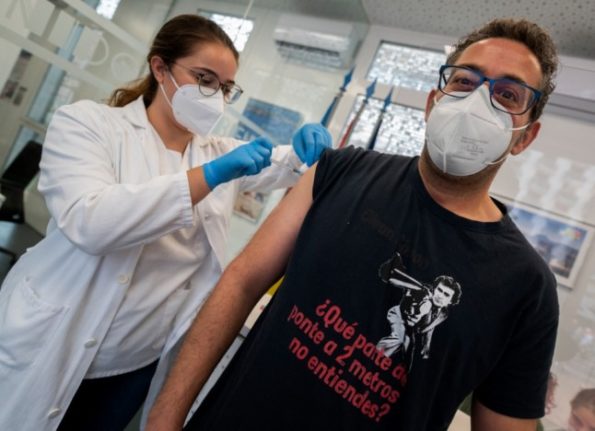Spain’s Health Minister Carolina Darias on Thursday told journalists Covid-19 vaccines will continue to be voluntary in Spain given the “very high awareness of the population” with regard to the benefits of vaccination.
This follows the words of European Commission chief Ursula von der Leyen on Thursday, urging Member States to “think about mandatory vaccination” as more cases of the Omicron variant are detected across Europe.
READ ALSO: Is Spain proving facts rather than force can convince the unvaccinated?
“I can understand that countries with low vaccine coverage are contemplating this and that Von der Leyen is considering opening up a debate, but in our country the situation is absolutely different,” Darias said at the press conference following her meeting with Spain’s Interterritorial Health Council.
According to the national health minister, this was also “the general belief” of regional health leaders of each of Spain’s 17 autonomous communities she had just been in discussion with over Christmas Covid measures.
READ MORE: Spain rules out new restrictions against Omicron variant
Almost 80 percent of Spain’s total population is fully vaccinated against Covid-19, a figure which is around 10 percent higher if looking at those who are eligible for the vaccine (over 12s).
It has the highest vaccination rate among Europe’s most populous countries.
Germany announced tough new restrictions on Thursday in a bid to contain its fourth wave of Covid-19 aimed largely at the country’s unvaccinated people, with outgoing Chancellor Angela Merkel speaking in favour of compulsory vaccinations, which the German parliament is due to vote on soon.
Austria has also already said it will make Covid-19 vaccines compulsory next February, Belgium is also considering it and Greece on Tuesday said it will make vaccination obligatory for those over 60.
But for Spain, strict Covid-19 vaccination rules have never been on the table, having said from the start that getting the Covid-19 jabs was voluntary.
There’s also a huge legal implication to imposing such a rule which Spanish courts are unlikely to look on favourably.
Stricter Covid restrictions and the country’s two states of alarm, the first resulting in a full national lockdown from March to May 2020, have both been deemed unconstitutional by Spain’s Constitutional Court.
READ ALSO: Could Spain lock down its unvaccinated or make Covid vaccines compulsory?
The Covid-19 health pass to access indoor public spaces was also until recently consistently rejected by regional high courts for breaching fundamental rights, although judges have changed their stance favouring this Covid certificate over old Covid-19 restrictions that affect the whole population.
MAP: Which regions in Spain now require a Covid health pass for daily affairs?
“In Spain what we have to do is to continue vaccinating as we have done until now” Darias added.
“Spaniards understand that vaccines are not only a right, they are an obligation because we protect others with them”.
What Spanish health authorities are still considering is whether to vaccinate their 5 to 11 year olds after the go-ahead from the European Medicines Agency, with regions such as Madrid claiming they will start vaccinating their young children in December despite there being no official confirmation from Spain’s Vaccine Committee yet.
READ MORE: Will Spain soon vaccinate its children under 12?
Spain’s infection rate continues to rise day by day, jumping 17 points up to 234 cases per 100,000 people on Thursday. There are now also five confirmed cases of the Omicron variant in the country, one through community transmission.
Hospital bed occupancy with Covid patients has also risen slightly nationwide to 3.3 percent, as has ICU Covid occupancy which now stands at 8.4 percent, but the Spanish government insists these figures are “almost three times lower” than during previous waves of the coronavirus pandemic.



 Please whitelist us to continue reading.
Please whitelist us to continue reading.
This article has mistakenly said that the German government has announced a mandate. It hasn’t. Parliament has yet to vote. Surprising oversight here.
“…and Germany’s announcement that it will make vaccines compulsory in February.”